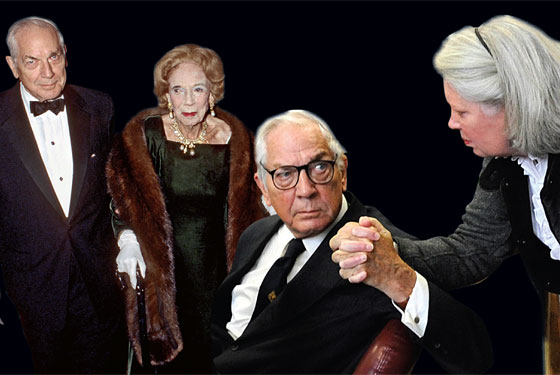
Last week, a jury found Tony Marshall, 85, guilty of enriching himself at the expense of his aging mother, Brooke Astor, the darling of high society until her death in 2007. In a six-month-long case, the prosecution called 72 witnesses—Tony Marshall none. The district attorney not only laid out the details of Marshall’s crimes but also, with seeming moral indignation, sought to destroy any illusions about his character and that of his wife, Charlene. Witnesses for the prosecution claimed that it was Charlene who was behind the manipulation of Brooke’s wills and the ransacking of her assets. The prosecution portrayed Charlene, the younger, down-market wife, as, essentially, a greedy harlot.
It was never mentioned that Charlene’s model may well have been the doyenne herself, who lived to 105, outlasting most of those who might recall the origins of her exaltedness. Brooke was the original younger wife. She started out a feisty military brat (and a journalist for a time), and married the fabulously wealthy and irascible Vincent Astor. It had, as Frances Kiernan asserts in her biography of Brooke, the appearance of a business arrangement. Brooke was to receive $5 million—think of it as a retention bonus—if the marriage (her third) lasted a year. Sickly Vincent held out for almost six years, and she ended up with much of his fortune. Brooke devoted herself to Vincent, and some said came to love him, but it was at the price of largely ignoring Tony, her only child (from her first marriage). Tony wasn’t even supposed to call. Brooke, as even she knew, was a wretched mother. She’d shipped Tony off to boarding school to focus on her second marriage.
The prosecution called to the stand Brooke’s butler and housekeepers, as well as friends like Annette de la Renta, David Rockefeller, and Henry Kissinger. Witness after witness recounted the nasty asides that the endearingly gossipy Brooke made about her only son and his meaty wife. It was Brooke who said Charlene (“a bitch”) had “no neck and no class.” And it was Brooke who belittled her son as a disappointment to her dear friends. What parent behaves that way? But Brooke was also witty and charming, praised for her energy, her love of life (she danced into her nineties), and her generosity.
And so Tony was left with Charlene, probably the first mothering figure he’d known. All the while, he refused to accept that Brooke didn’t care for him. “My mother loved me,” he once told me. And that was the thrust of his defense.
The jury found that he, with Charlene’s encouragement, pushed a failing woman into will changes and asset transfers she didn’t initiate and may not have wanted. But Tony told himself that his mother’s generosity was an expression of her love. Sadly, Tony equated love with money, but then who could blame him? It was a family tradition. The message of Brooke’s bargain with Vincent Astor was that money and love are inseparable.
See Also
Fishman on the Battle Over Astor’s Estate
Have good intel? Send tips to [email protected].